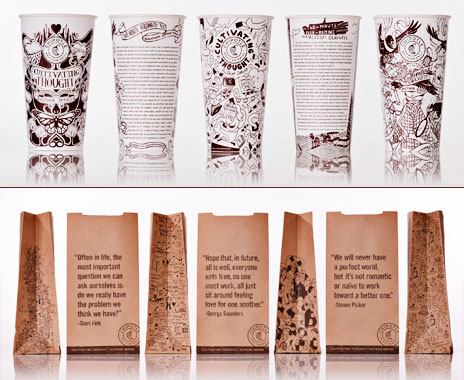Michael Lewis’s thoughts on managing time. A George Saunders note to the future. Barn raising with Malcolm Gladwell. These aren’t part of a short story anthology or panels at a literary conference; they’re what is now plastered on the side of a Chipotle cup.
What started as an idea from writer Jonathan Safran Foer has turned into Chipotle’s newest food packaging initiative, “Cultivating Thought,” which is leveraging creative content to catch customers’ attention.
“As part of our effort to change the way people think about and eat fast food, we often produce programs that are designed to make people more curious about their food and where it comes from. Here, we’ve simply extended that beyond food and wanted to produce content that would entertain and make people think about things that they might not have thought about before,” says Danielle Winslow, Chipotle spokeswoman, in an email to QSR.
“Beyond that, this series also gives our nearly one million daily customers access to writing from 10 different authors whose content and creative works may otherwise be unfamiliar or out of reach.”
The initiative features authors and commentators that, along with Lewis, Saunders, and Gladwell, include Toni Morrison, Judd Apatow, and Sarah Silverman. The essays vary in topic, but are all designed as “two-minute readings” that are printed on bags and cups. Foer has complete editorial control over the series’ content, and the packaging allows for roughly 1,700 characters with spaces.
“It’s sort of a modern take on the back of the cereal box,” says Leeann Leahy, president of marketing firm The VIA Agency. “It’s a way to provide interesting, useful, entertaining information that’s beyond ingredients.”
Leahy says Chipotle has become a brand known for its thoughtfulness and insightfulness, and that this initiative aligns perfectly with that position.
Chipotle has consistently used its branding to convey thoughts and ideas beyond just what’s on the menu. In 2012 and 2013, the company released two animated short videos highlighting its opposition to factory farming. The first, “Back to the Start,” depicted a farmer who converted his farm to an industrial animal factory until his guilt caused him to release all the livestock back into pastures. “The Scarecrow,” meanwhile, showed the life of a factory-working scarecrow, flashing images of packages stamped with “100% Beef-Ish!” and cows trembling in metal cages.
In an interview last year with The New Yorker, Chipotle’s communications director, Chris Arnold, said “The Scarecrow” was meant to “highlight issues like the overuse of antibiotics, harsh confinement of animals, the extent to which food is processed.”
The “Cultivating Thought” initiative similarly highlights issues affecting today’s consumers. For example, in the “Cultivating Thought” essay “A Two-Minute Case for Optimism,” Steven Pinker writes that “news presents a distorted view of the world. News is about things that happen, not things that don’t happen.” And in “A Two-Minute Case Against Limits,” Sheri Fink writes, “Sometimes I worry about how dependent we’ve become on our smartphones and electronic gadgets, on long-distance supply chains, on commodities and food prepared by others, how vulnerable we might be when all that fails.”
Packaging has been used as a billboard for many years, and Chipotle’s initiative is just another way to communicate a message, says Lynn Dyer, president of the Foodservice Packaging Institute.
“So instead of just communicating the brand’s message, you’re communicating another type of message,” Dyer says.
She adds that there have been many quick-service restaurant packaging initiatives that have attempted to turn the packaging into a brand extension that moved beyond simple company advertising. Those have included anything from Sbarro’s interactive “LidRock” campaign in the early 2000s, where fountain-drink lids contained CDs, to Starbucks’s recent designer mug collaborations.
Both Dyer and Leahy say they don’t foresee any downside to the “Cultivating Thought” series.
“Anytime you embark on something that is thoughtful and insightful, there will probably be some naysayers,” Leahy says. “Somebody’s probably going to find some controversy about a piece of content at some point, but that really just sparks more debate, and I think Chipotle wins in that.”
But she adds that the key to the initiative is keeping the content fresh. “If they can really draw on interesting authors and commentators to provide enough new and different fodder, I think it has lots of staying power,” Leahy says. “It’s a big undertaking because it needs to be constantly edited and curated.”
Another reason “Cultivating Thought” may have staying power is its potential to attract curious consumers; Dyer says the packaging alone can draw people into Chipotle and drive sales.
“There may be people going to check out Chipotle just for the packaging, which from our standpoint, is fantastic,” she says.










